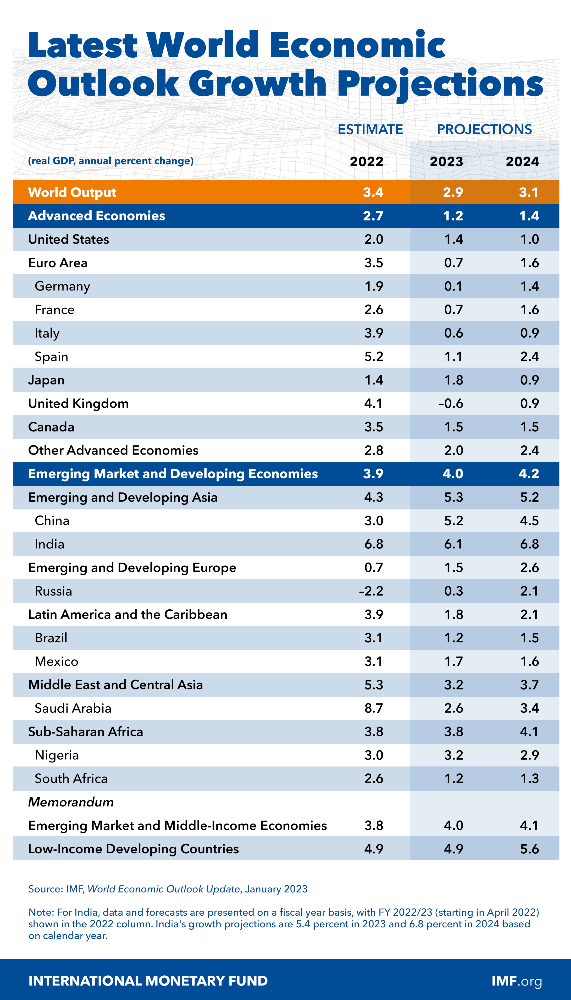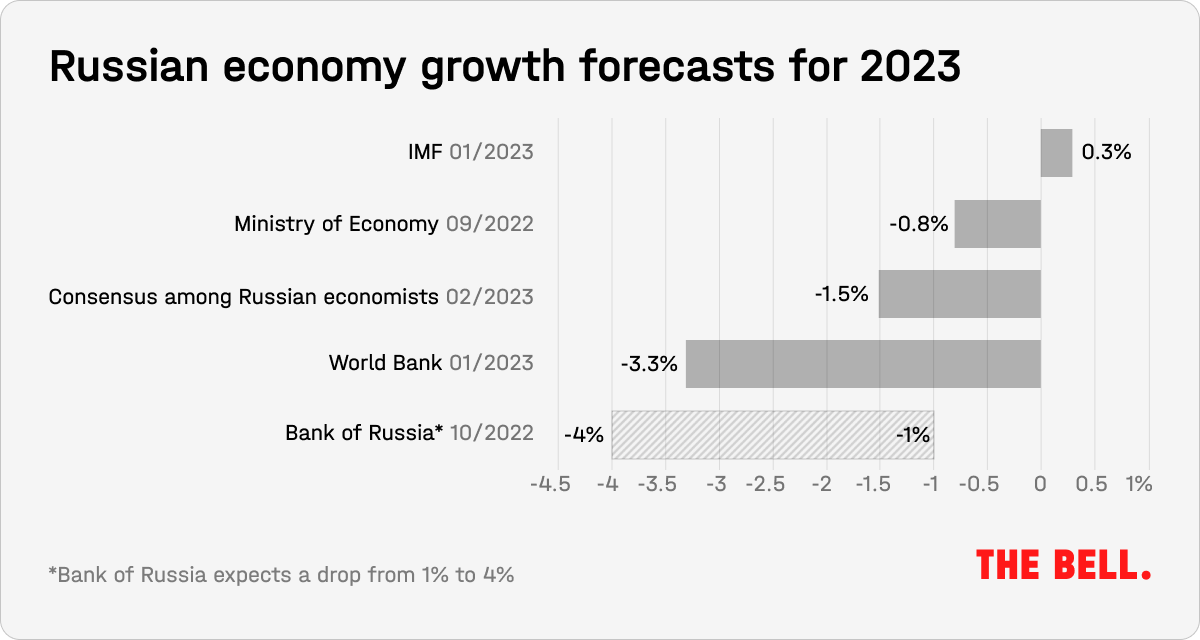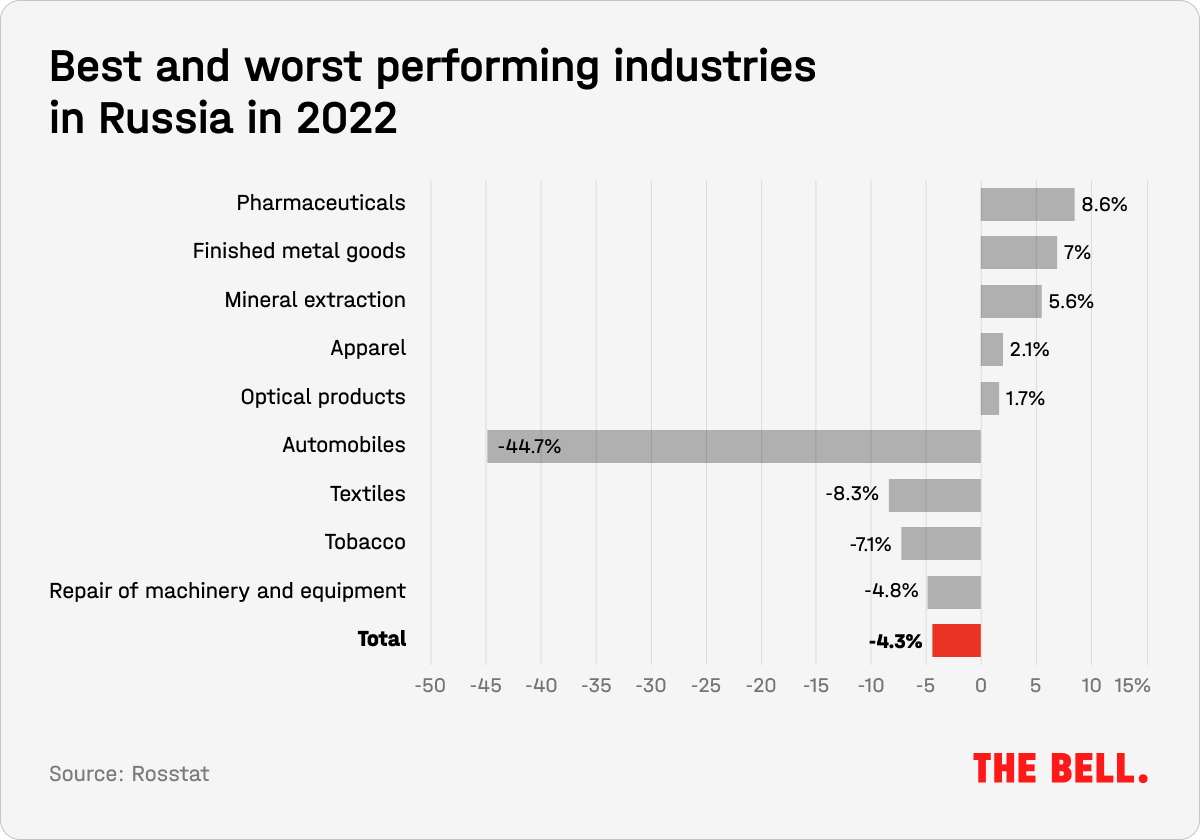
IMF upbeat on Russia’s economy
Hello! This is Alexandra Prokopenko with your weekly guide to the Russian economy — brought to you by The Bell. In this newsletter, we’ll look at whether the IMF’s rosy predictions for Russia’s economy are realistic, Putin’s upcoming state-of-the-nation address and U.S. warnings to countries helping Russia avoid Western sanctions.
IMF predicts Russian economy to rebound in 2023
International economic institutions, which recently doubted Russia’s economy could survive under Western sanctions, are now sounding more optimistic than even the Russian government. The International Monetary Fund (IMF), known for its gloomy forecasts, this week predicted Russia’s GDP will grow at 0.3% this year.
The typically conservative IMF was much more upbeat than usual in its most recent forecasts for the global economy — for which it anticipates 2.9% growth (up 0.2 percentage points from its October forecast) because of “unexpectedly stable” dynamics.
Russia’s forecast was upgraded even more than the global figures: in October, the IMF expected a 2.3% fall in Russian GDP in 2023, now it is talking about 0.3% growth. In 2024, they believe Russia’s GDP will increase by as much as 2.1%.

IMF economists explain this surge of optimism with a familiar narrative: the stability of Russian oil exports. “At the current oil price cap level, Russian crude oil export volumes are not expected to be significantly affected, with Russian trade continuing to be redirected from sanctioning to non-sanctioning countries,” the report stated.
The IMF’s latest figures are the most optimistic forecast around. They are well above the February consensus among Russian economists (decline of 1.5% in 2023) and the official projections of the Russian authorities: the Ministry of Economic Development currently predicts a fall of 0.8% in 2023, while the Central Bank expects a drop of up to 4%.

If Russia’s economy is to live up to the IMF’s expectations, output needs to increase by 0.4% every quarter from the fourth quarter of last year to the fourth quarter of 2023, according to a Telegram channel run by Bloomberg Economics’ Alexander Isakov. The economist thinks this is realistic. “The shocks of losing the European gas market, the departure of car manufacturers and others remain… while retail lending is accelerating to finance a recovery in consumer demand,” Isakov wrote. “Thus, the IMF’s figures seem persuasive.”
What else does the IMF predict for 2023?
The forecast for China was upgraded from 4.4% to 5.2% and the projection for the U.S. goes from 1% to 1.4%. Germany is expected to avoid a recession and grow by 0.1%. Britain is alone among the world’s leading economies in that it is expected to finish the year with a drop in GDP — of 0.6%. That prediction prompted a wave of domestic criticism of the U.K. government, particularly from the opposition Labour Party.
“Economic growth proved surprisingly resilient in the third quarter of last year, with strong labor markets, robust household consumption and business investment, and better-than-expected adaptation to the energy crisis in Europe,” noted IMF chief economist Pierre-Olivier Gourinchas.
Other reasons for optimism are China’s unexpected post-Covid reopening and the return of a stable growth trajectory among developing countries (half the world’s global economic growth is set to be delivered by China and India).
Russia’s economy has adapted quicker than expected after the shocks of 2022. Central Bank analysts see five underlying reasons for this:
- The stability of the banking system. Thanks to ample capital reserves, banks have remained in reasonable shape — while lending was supported by regulatory easing;
- Falling export volumes offset by rising prices;
- Rapid redirection of exports toward Asia;
- An effective reshaping of logistics chains by import-based businesses;
- Government support.
Business activity in Russia continues to recover. According to an updated State Statistics Service (Rosstat) estimate and the Central Bank’s figures, in the third quarter the economy turned a corner (+0.86% compared with the previous quarter). Russia’s economy moves into 2023 with a higher level of activity than was expected in the spring, Central Bank analysts wrote last month. Demand has been underpinned by government spending.
However, it’s important to point out that the economic recovery is patchy.
Constraining factors include a growing preference for saving rather than spending among the general population, difficulties with maintaining imported equipment and staff shortages.
In November, almost half of Russian businesses (45%) reported staffing problems. The dwindling workforce and the significant wartime brain drain could result in fierce competition to hire the remaining talent. And that will likely push up salaries faster than productivity can match, bringing inflationary risks (The Bell recently spoke at length with Vladimir Gimpelson, director of the Center for Labor Studies at the Higher School of Economics about current trends on the labor market).
“The IMF scenario is clearly the most optimistic of the possible outcomes that have some chance of happening in 2023,” said Dmitry Polevoi, investment director at Loko-Invest.
“However, from our point of view, GDP will still fall by 1.5-2.5% in 2023 due to weak demand at home and abroad, coupled with high levels of uncertainty.”
Why the world should care
The IMF figures are plausible if Russia’s economy does not suffer any more major shocks in 2023 — for example, a sharp fall in energy prices or a major geo-political defeat. The IMF updates its predictions several times a year and, as new data emerges, further corrections will likely follow. There remains a lot of uncertainty.
Putin set to mark the anniversary of Ukraine invasion with a special address
Russian President Vladimir Putin could deliver his annual state-of-the-nation address on the eve of the first anniversary of the invasion of Ukraine, according to sources at state news agencies TASS and RIA Novosti.
Putin’s press secretary Dmitry Peskov has yet to confirm or deny these reports.
The president is constitutionally obliged to deliver an address to members of both chambers of Russia’s parliament, as well as senior judges, officials and other invited public figures every year. In 2022, however, Putin neglected this duty. Typically, Kremlin aides and members of the government are actively involved in preparing the content of the speech. However, the final word rests with Putin himself.
Independent journalist Farida Rustamova wrote last month that the authorities had resumed work on preparing the presidential address. Her sources close to the government are somewhat anxious about what Putin might say — since his state-of-the-nation speeches are often used to make major policy announcements.
In 2020, Putin used the speech to introduce constitutional reforms that, among other things, enable him to stand for election again in 2024. In 2018, the address was accompanied by video clips showing the latest Russian missiles striking hypothetical U.S. targets. The speeches are also an opportunity for Putin to announce funding pledges.
Why the world should care
The address is not merely Putin’s “latest update” — it is also meant to outline his vision for the medium and long-term development of the country. It is likely that new details will be forthcoming about Russia’s plans in Ukraine. Other possible topics are: Russians who left the country; possible social payment indexation; state handouts; defense industry issues; and how Russia plans to build its relationship with the outside world.
The U.S. warns, Turkey, UAE and Oman about breaking sanctions
The U.S. Department of the Treasury’s Under Secretary for Terrorism and Financial Intelligence Brian Nelson traveled to Oman, the United Arab Emirates and Turkey this week to meet with officials, businesses and financial institutions to reiterate that Washington will continue to enforce its sanctions on Russia. Reuters reported that, during the trip, Nelson will discuss the U.S. efforts to crack down on Russian attempts to evade sanctions.
Turkey was one of Russia’s biggest trading partners last year, and a key middle-man in accessing Russia. However, this special relationship could be ending: Turkey’s leading operator of ground services for airlines, Havaş, this week told Russian carriers that it would be unable to service 170 aircraft at Turkish airports due to U.S. export sanctions. The company said it can only service aircraft with fewer than 25% U.S.-made parts.
Why the world should care
Russia’s aviation industry does not anticipate an end to flights to Turkey and is seeking alternative operators, according to the RBC media outlet. But the problem is that aviation could easily become a test case for the West to show they are able to isolate a key Russian sector. For Russian carriers, the loss of routes to Turkey would be another blow. And for Russians, it would further reduce the limited options for international flights.
Figures of the week
- The average price for a barrel of Russian Urals crude last month was $49.5, according to the Finance Ministry. That’s a little less than in December ($50.5).
- Weekly inflation in Russia picked up speed to 0.21% last week after falling to 0.14% the previous week, according to the Ministry of Economic Development. Annual inflation remains at 11.5%. Some analysts feel these figures give a good reason for a stern signal on monetary policy at the upcoming Central Bank rates meeting.
- Inflation expectations fell last month, but remain high. According to a survey, people expect inflation at 11.6% this year. Similarly, businesses also expect high prices — although that expectation has also fallen slightly.
- PMI remained high in January at 52.6 points, compared with 53 in December. The slight fall is due to the lengthy New Year holidays.
- Industrial output in 2022 dropped just 0.6% year-on-year, according to Rosstat. In December, industrial productivity was down 4.3% compared with the same month a year earlier, but up 10.3% compared with November. The biggest growth was in war-related industries: medicines (up 8.6%), metal parts (7%), clothing (2.1%) and optical products (1.7%). In addition, mining output was up 5.6%. The biggest declines were in car manufacturing (-44.7%), textiles (-8.3%) and tobacco products (-7.1%).
- Oil and gas revenues in January were 52 billion rubles lower than the Finance Ministry expected due to a decrease in natural gas export duty earnings. In January, oil and gas revenues hit 425.5 billion rubles (-46% year-on-year), the lowest level since August 2020.

Next week’s key data
- January inflation figures (08.02)
- The Central Bank’s interest rate meeting (10.02)
Essential reading
- The Risks of Russia’s Growing Dependence on the Yuan (Alexandra Prokopenko examines the growing role of the yuan in Russia’s economy)
- EFFECTIVENESS OF U.S. SANCTIONS TARGETING RUSSIAN COMPANIES AND INDIVIDUALS (sanctions-related changes in trade volumes, costs and geography following Russia’s invasion of Ukraine)
- CRISIS IN ABUNDANCE: WHY DID THE RUSSIAN ECONOMY FAIL TO COLLAPSE AND IS THERE A CRISIS ON THE HORIZON? (Oleg Itskhoki analyzes how the Russian economy avoided collapse)
- How the War in Ukraine Became a Magnet for Russia’s Career Politicians (Andrei Pertsev explains how Russian politicians use the war for political point scoring)




